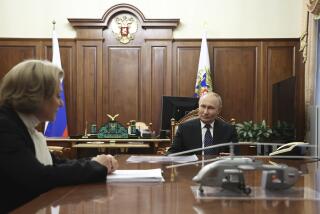Yeltsin Acts to Put Down Unrest in Caucasus Region : Soviet Union: He declares a state of emergency in the secessionist Chechen-Ingush area.
- Share via
MOSCOW — Russian Federation President Boris N. Yeltsin declared a state of emergency Friday for the mountainous Chechen-Ingush region in an attempt to end a takeover by local nationalists who have declared their independence.
Yeltsin acted on the eve of today’s presidential inauguration of the region’s strongman, Gen. Dzhokar Dudayev, who won 90% of the votes in an election two weeks ago. Yeltsin had declared the elections illegal in advance.
Although the challenge is relatively minor and the region of 1.5 million is far to the south of Moscow in the Caucasus Mountains, Yeltsin appears determined to halt the Chechen secessionist drive in order to discourage larger and wealthier regions from declaring their independence.
To enforce the state of emergency and end the secession, Yeltsin appointed a presidential representative with the authority to rule by decree and gave Soviet Interior Ministry troops full powers of search and seizure. He also imposed a curfew and banned political rallies.
Yeltsin said he was responding to the growing unrest in the region, “brought on by illegal actions of the executive committee of the National Congress of the Chechen People and congress leaders who seek to remove from power the lawful state bodies by stirring up mass unrest with the use of violence.”
But the local politics of the Chechen-Ingush region are extremely complex--even for the troubled Caucasus, where the republics of Armenia, Azerbaijan and Georgia are also in turmoil.
Dudayev, 46, a retired Soviet air force general who claims that he commands an army of 62,000 volunteers, last month overthrew local officials who had supported the failed coup against Soviet President Mikhail S. Gorbachev in August.
The Chechen National Congress, headed by Dudayev, began mass protests immediately after the coup, and its armed militia seized local government buildings and broadcast facilities. Efforts by Yeltsin envoys to halt the unrest failed, and the militia refused to surrender its weapons as ordered.
On Friday, about 1,000 demonstrators gathered in front of the local Interior Ministry headquarters in Grozny, the Chechen capital, to demand that its officers back Dudayev in his takeover of the region, and ministry officials expressed fears the crowd would storm the building, the Soviet news agency Tass reported.
The roots of the conflict go deeper, however, with the predominantly Muslim Chechen seeking to re-establish the independence that they lost in the late 1850s, when they were conquered and added to the Russian empire after 70 years of almost continuous fighting.
After the Bolsheviks came to power, they battled collectivization with such ferocity that dictator Josef Stalin in 1944 ordered virtually the whole population--400,000 Chechens and 90,000 Ingush--deported, accusing them of collaborating with the invading Germans. They were allowed to return to the region after 1957.
Nationalists began campaigning nearly two years ago for the restoration of the region’s borders to what they were in 1934, a move that would enlarge the territory. In May, the local government declared the “sovereignty” of the Chechen-Ingush Autonomous Republic, one of 20 such regions in the Russian Federation. About 52% of the population is Chechen, 17% Ingush and 25% Russian.
More to Read
Sign up for Essential California
The most important California stories and recommendations in your inbox every morning.
You may occasionally receive promotional content from the Los Angeles Times.













